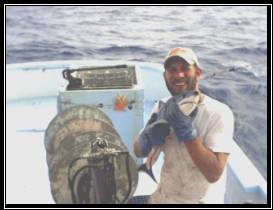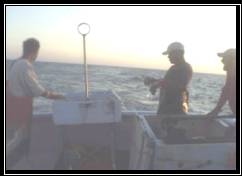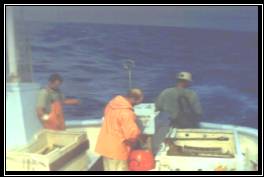David Kerstetter
Ph.D. student

Education:
- Bachelor of Arts in Political Science. 1995. Edinboro University of Pennsylvania. Honors Thesis: “Expert witness for whom? The Role of Court-Appointed Expert Witnesses under Federal Rule of Evidence 706.”
- Master of Public Policy. 1998. The College of William & Mary, Thomas Jefferson Program in Public Policy. Regulatory policy focus.
- Master of Science in Marine Science. 2002. The College of William & Mary, Virginia Institute of Marine Science. Thesis: “Use of Pop-up Satellite Tag Technology to Estimate Survival of Blue Marlin (Makaira nigricans) Released from Pelagic Longline Gear.”
Research:
My thesis research involved the post-release behavior for blue marlin from commercial longline fishing operations. This project used pop-up satellite archival tags (PSATs) to obtain data and includes analysis of the recorded activities of tagged fish with biological and oceanographic parameters and coordination of project with tag manufacturer. Tags were deployed off pelagic commercial longline fishing vessels in Bermuda and the southeast United States. This research had essentially three objectives: Objective 1: Evaluate PSAT technology and protocols on commercial fishing vessels. Because these tags had never before been used off commercial vessels, this project also examined the use of these tags and their associated protocols. I found that the tags are (fairly!) easily and quickly applied, and that the protocols I developed appear effective in minimizing interference with normal crew activities. Objective 2: Assess post-release behavior (survival) from commercial longlines. We had seven of nine deployed PSATs returned data, indicating survival for at least five days at-large, even with a tagging protocol designed to simulate the often less-than-favorable conditions of the commercial fisherman that must release incidentally caught billfish. Results showed that individual movements are generally consistent with previous recreational post-release research using acoustic telemetry tags. Objective 3: Enable managers to use data to develop international management measures for species recovery. Evidence that supported the position that released billfish survive was presented to U.S. delegates – and used qualitatively during negotiations – at an international pelagic fisheries management meeting in November 2000. There is also evidence that this research is stimulating other countries to conduct similar lines of research from commercial fishing vessel platforms. This thesis work was successfully defended in December 2001, with formal graduation in May 2002.
For my dissertation work, I will study the specific interaction patterns of billfish with pelagic longline fishing gear, examining this fishing method for patterns of billfish catch based upon such variables as bait type, time of set, and leader/buoy drop length. I will also continue work on post-release survival by broadening the thesis work onto white marlin (Tetrapturus albidus) released from the commercial longline gear. This study of interactions will examine the PSAT data with those from traditional gut-content and stable isotope analyses to determine the habitat preferences of the billfishes. On-going cooperative work with the Miami Laboratory of the U.S. National Marine Fisheries Service will focus on aspects of basic billfish biology, such as growth and reproduction.
I also have funded grant research: Post-implementation Effects of Closed Areas on Commercial Pelagic Longline Fishing, a project sponsored by the University of Hawaii – Manoa-based Pelagic Fisheries Research Program to analyze effects of large-scale area closures on the western North Atlantic- and Hawaii-based longline fleets. On-going work includes economic analyses, examination of fleet-wide vessel movements, and comparison of overall efficacy of area closures with regulatory intent. This research is provisionally scheduled for presentation at the 2003 Tuna and Billfish Research Conference, Lake Arrowhead, California.
Finally, I also have a strong interest in international fisheries management, which was strengthened by experience with the NMFS International Fisheries Division as a Dean John A. Knauss Fellow in 1999-2000. Both during that Fellowship and since, I have participated in the annual meetings of the International Commission for the Conservation of Atlantic Tunas (ICCAT) since 1999. During these meetings, I not only provided technical and administrative support for the U.S. delegations, but also served the Commission during the various meetings as Rapporteur for the Permanent Working Group for the Improvement of ICCAT Statistics and Conservation Measures and the Compliance Committee. This work additionally includes work with the domestic component of this international management, including providing technical and administrative support for U.S. ICCAT Advisory Committee meetings.
Publications:
Kerstetter, D.W., J.J. Polovina, and J.E. Graves. In review. Evidence of Shark Predation and Scavenging of Fishes Equipped with Pop-up Satellite Archival Tags. Fish. Bull.
Kerstetter, D.W., B.E. Luckhurst, E.D. Prince, and J.E. Graves. 2003. Use of pop-up satellite tags to evaluate survival of blue marlin (Makaira nigricans) from pelagic longline fishing gear. Fish. Bull. 101(4): 939-948.
Non-Peer Reviewed Papers and Publications:
A.Z. Horodysky, D.W. Kerstetter, and J.E. Graves. 2003. Habitat preferences and diving behavior of white marlin (Tetrapturus albidus) released from the recreational rod-and-reel and commercial pelagic longline fisheries in the western North Atlantic ocean: Implications for habitat-based stock assessment models. ICCAT Working Document SCRS/03/033.
Goodyear, C.P., D. Die, D.W. Kerstetter, D.B. Olson, E.D. Prince, and G.P. Scott. 2002. Habitat standardization of CPUE indices: research needs. ICCAT Working Document SCRS/02/073.
Graves, J.E., D.W. Kerstetter, and E.D. Prince. 2002. Habitat preferences of blue marlin in the western north Atlantic: applicability of archival tag data to habitat-based stock assessment methodologies. ICCAT Working Document SCRS/02/071.
DuPaul, W., D. Rudders, and D.W. Kerstetter. 1999. Results of Modifications to Sea Scallop Dredge Twine Tops to Facilitate the Reduction of Finfish Bycatch: Georges Bank Closed Area II Experimental Fishery September-October 1998. Virginia Sea Grant Report.
Kirkley, J.E. and D.W. Kerstetter. 1997. Saltwater angling and its economic importance to Virginia. Special report in Applied Marine Science and Ocean Engineering No. 339, Virginia Sea Grant Publication VSG-97-04. (Downloadable .pdf file available from the VIMS library, but requires Adobe Reader.)


Setting longline gear off the stern of the F/V Carol Ann on Georges Bank, September 2002.
